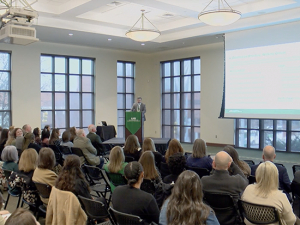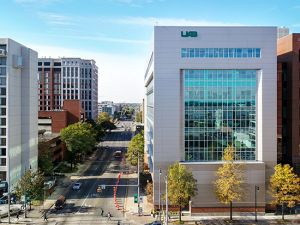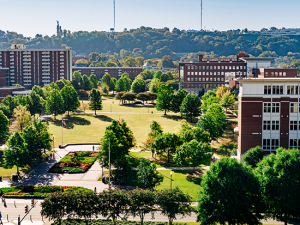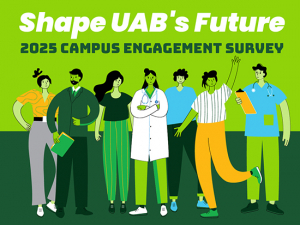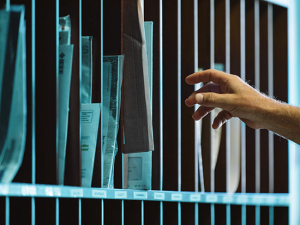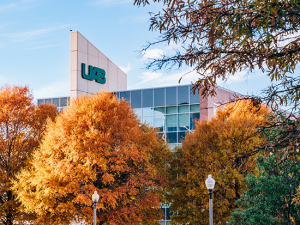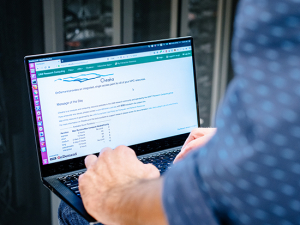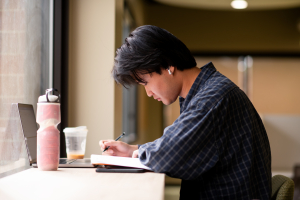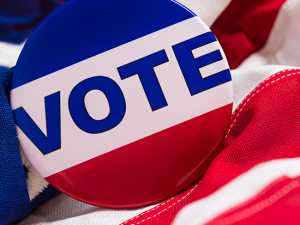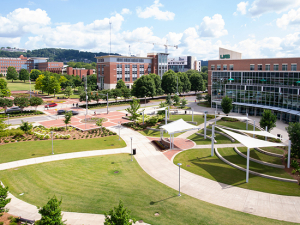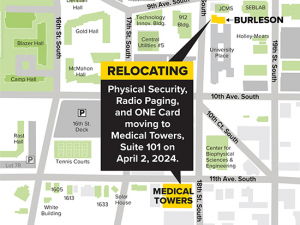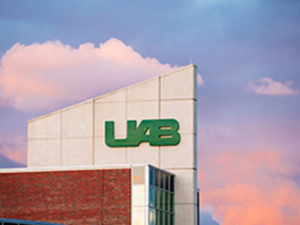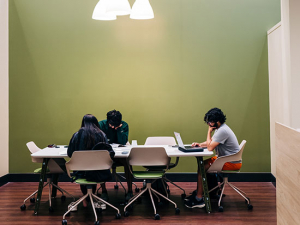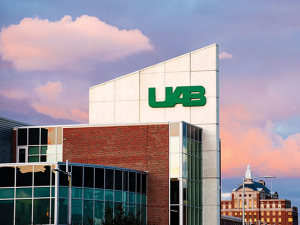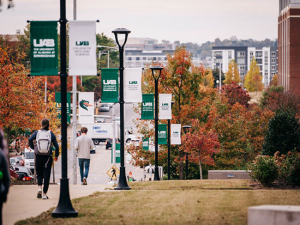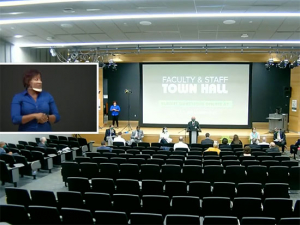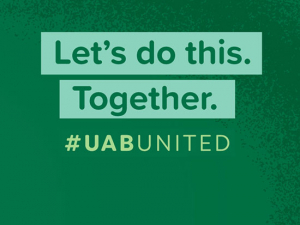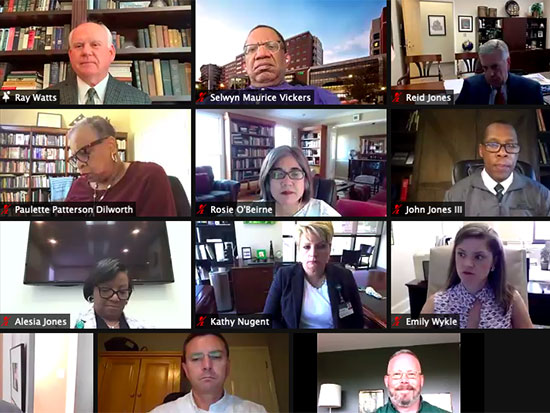 Watch the full State of the University presentation here. Following the State of the University presentation Oct. 20, President Ray Watts and senior leaders responded to questions submitted online by faculty, staff and students. Here are their answers, along with responses to questions that could not be addressed live due to time constraints.
Watch the full State of the University presentation here. Following the State of the University presentation Oct. 20, President Ray Watts and senior leaders responded to questions submitted online by faculty, staff and students. Here are their answers, along with responses to questions that could not be addressed live due to time constraints.
Scroll down to read the complete summary or use the links below to jump to specific topics
UAB accomplishments during COVID-19 and the decision to re-open
Student and employee mental health
Spring semester course modalities
Compensation and benefits questions
Employee Educational Assistance benefit
Working remotely and returning to campus
UAB accomplishments during COVID-19 and the decision to re-open
Q: What have we not been able to accomplish that's still on our immediate or longer-term planning list?
“Six months ago I would have had a different answer,” Watts said. “But today I would say that we have accomplished much on our goals and list of activities for this year, in spite of COVID. Now I think if you take COVID into account we've probably accomplished more than we have ever accomplished in the history of this great university. It's because of the work of our people…. I have never been more proud of UAB and our people and our community and our impact on our community. Our leaders and faculty and staff have worked so closely together. We've tried to communicate and express and show and share the challenges that we face so that we can all help participate in finding solutions.”
Watts noted the accomplishments of employees in several areas:
Bringing patient care back to full speed:
“In our hospital we have had the highest case mix index — which is the level of severity of illness — ever, but we've also taken care of more patients than ever, and we brought our clinical enterprise back up to full speed and it's actually ahead of full speed of a year ago.”
Returning to on-campus instruction:
“Being able to bring our students back to campus in this hybrid format in the fall has been a real important accomplishment…. We thought we might be down in enrollment but we are up. I think that shows the excellence of the programs but we also prepared as well as possible to make sure we had the safety measures in place on our campus through facial masking and through social distancing and through diligent hygiene and hand washing. We've done well on those fronts. There have been a few times where some have let down their guard and we've had some increases in students over the last couple of weeks and it just goes to show that we have to remain vigilant and we have to work with this virus in our midst. We know the most powerful way to do that is to use these safety measures until we develop vaccines that will hopefully protect people in a much broader way.”
Stabilizing finances in the university and Health System:
“Back in March we were looking at the severity of the impact on our health care enterprise and our university, and we were facing unprecedented challenges…. We had to implement strict cost-cutting measures… and we were able to stabilize our budget and end the [fiscal] year on Sept. 30 with a balanced budget. Going into fiscal 2021 with our increase in clinical activity and with our research enterprise returning to full speed and with our academic enterprise being very active we're going to have a good year.”
There are still challenges to overcome, Watts said. “Fortunately our state budget is stable. It will be about 2% above last year; that 2% unfortunately was taken up by expenses like new technology for our hybrid classrooms, etc. But we will have a positive bottom line, and I want to thank our leadership in our financial areas: Allen Bolton, senior vice president for Finance and Administration and his entire team; Dawn Bulgarella, chief financial officer of UAB Medicine and the Health System; and the leaders in the School of Medicine and the other schools who worked hard to implement these cost-cutting procedures.
Although there will not be a merit pool for salary increases in fiscal year 2021, leaders were pleased to return the employer match for the 403(b) retirement plan, allow rollover of vacation time from 2020 through the end of 2021 and add two vacation days around Christmas and New Year's “so that our employees can have increased time with their family and friends and recharge their batteries,” Watts said. “We want them to be excited about coming back for 2021.”
Question submitted online:
Q: Do you believe the decision to resume in-person courses through the hybrid system was a wise decision?
Yes. As long as our county and state are experiencing community spread of COVID-19, there is risk in any public place. We have an opportunity to take extensive precautions to make our campus one of the safer places people can be, which we have done. Testing and contact tracing has indicated that the vast majority of spread is happening off campus. The hybrid system has reduced the number of students in class to allow for adherence to social distancing guidelines, and compliance with Healthcheck, testing and mask wearing have been good on campus.
[back to topic list]
Student-related questions
Q: A recent email went out to students addressing off-campus gatherings. The email said there could be escalating sanctions imposed on students. Could you give a little background to that communication?
“If you look over the last two weeks, the number of students that have tested positive has increased significantly, with last week being the highest number” so far this semester, said John Jones, Ph.D., vice president for Student Affairs. “Looking to our public health experts and our medical providers, as well as contact tracing, what we're understanding is that it's not the behavior of our students on campus that's caused an increase — it’s the behavior of students off campus. So we're taking a more proactive approach to help our students understand what the implications are and try to mitigate the increase in cases.”
Discussions with students and student leaders have included concern about the increased number of positive students, said Selwyn Vickers, M.D., senior vice president and dean of the School of Medicine. “But most of all the positive message that we gave, hopefully, was how proud we were of the students and what they had accomplished,” Vickers said. “I think the whole campus should be extremely proud of UAB's performance and protecting our staff and students. We have really been recognized on a national level [for that]. Yet with that said there has been an uptick, which is significant for UAB. It doesn't reach the level of some other schools our size, but it's big for us. And so our efforts… highlighted that we found that on-campus remains extremely well managed and arguably very safe as it relates to transmitting the virus. But activities off-campus clearly appear to be the source of the increasing numbers that we've had. So that was why the focus [has been made] to try to address that.”
[back to topic list]
Question submitted online:
Q: [A student asks:] What are the repercussions for gathering off-campus?
Off-campus social gatherings of any size that involve individuals from different households and where appropriate distancing is not maintained are prohibited by state health ordinance and UAB policy, and masks are required in public establishments. A student who is found to have violated an ordinance or policy will be adjudicated through the student conduct process. Repercussions could vary by offense, but serious and repeated violations will result in suspension.
[back to topic list]
Question submitted online:
Q: Students have reported getting inconsistent information from UAB faculty and staff on COVID-19 protocols, clearance to enter class, quarantines, etc. What can be done about this?
The pandemic has required a great deal of communication, and some policies and guidance have evolved as we've adapted to this fluid situation. A UAB COVID-19 information hotline has been established at 205-934-SAFE to provide answers and clarifications, and the uab.edu/uabunited website offers a broad range of information that is updated continually to reflect the latest policies and guidance. Students are encouraged to read official UAB emails — including GreenMail every Wednesday (anyone can subscribe to GreenMail here: https://uab.tfaforms.net/217785) — for real-time updates, as well as attend the virtual town hall meetings. If these resources are not sufficient, please contact the Division of Student Affairs or Student Health Services.
[back to topic list]
Q: What is the current plan to ease students back into in-person instruction and on-campus activities? So many are struggling with anxiety and depression under the isolation of COVID restrictions.
“Right now, as Dr. Vickers just indicated, there is an uptick in cases,” said Provost Pam Benoit. “So our plan for the spring is to continue with the variety of different kinds of instructional methods that we had this term and to begin on Jan. 19.”
“At the same time we recognize that everyone has fatigue with the pandemic and we're trying to work with students and faculty and staff to think about different ways to address mental health issues and give opportunities for safe ways to socially engage with others,” Benoit said. “I know that Dr. Jones's Student Affairs organization has been working very intently both this semester and we're also doing planning for next semester for students to have different kinds of ways of addressing mental health issues.”
Student Counseling Services is adding additional counseling staff to support students as they face mental health challenges, Jones added. “We understand that our students are in significant need like all of us as we continue to face this pandemic.”
“I also want to remind all of us that the stress of the pandemic also affects faculty and staff and the Employee Assistance and Counseling Center is available to address any concerns or anxiety that you may be feeling,” Benoit said. “We know that this is something that is affecting our entire community.”
“I think it's important for everyone to understand that we are doing and want to do everything possible to support our people — our faculty and staff and our students,” Watts said. “We are increasing those activities and if more is needed, we will do whatever we need to help meet the needs of our UAB community.”
[back to topic list]
Question submitted online:
Q: This semester, it seemed like course offerings changed at the last minute for many students. Some students strongly prefer in-person classes and get frustrated when a course gets changed to online at the last minute. Can we guarantee that classes will retain the same format as planned now in Banner?
Banner course listings reflect their intended teaching modality (in-person, hybrid, remote or fully online) based on input from departments and on classroom availability. Inevitably, circumstances can change that might cause that modality to have to change, such as the personal circumstances of an instructor. We make every effort not to have to make changes in a teaching modality in a particular course.
[back to topic list]
Question submitted online:
Q: Will Summer 2021 be similar to these past two semesters?
A decision regarding the variety of teaching modalities to be utilized during the summer 2021 semester will be made during the spring semester. Until a decision has been made, faculty can be proactive in developing course materials by designing the courses on the Canvas LMS. For assistance with course development, please contact the UAB Division of eLearning for full support and training.
[back to topic list]
Question submitted online:
Q: What are plans for future enrollment growth? Is there a target we would like to hit?
Total enrollment has been projected to increase between 300-500 students annually through 2025; however, COVID-19 has created economic and social stresses on families in this country and across the globe that have and will continue to challenge goal attainment for UAB and for the majority of colleges and universities.
[back to topic list]
Compensation and benefits questions
Q: Are merit increases still off the table? UAB has saved millions of dollars in the pandemic through furloughs, savings with employees working off campus, CARES Act funding, increased enrollment, increased research funding and finally by not matching our retirements for six months. If not [to merit increases] where are all of these savings going?
“As Dr. Watts mentioned, we are not moving forward with the merit program for the current fiscal year that just began two weeks ago, and that is because of the financial impact of the pandemic,” said Allen Bolton, senior vice president for Finance and Administration.
“The questioner is correct in some of the savings that have been [mentioned] but there have also been significant investments in the campus to prepare to resume operations during the pandemic,” Bolton said. These include major expenditures on:
- classroom technologies that have enabled hybrid and remote learning;
- COVID testing across campus; and
- cleaning supplies and protocols, including the face masks that were provided to all students, faculty and staff.
It is important to note that without the cost-saving measures UAB has implemented, “we would have lost $50 million,” Watts added. “If we hadn't done those things we would be like a lot of other universities, wondering how we're going to survive. The Health System faced even greater challenges and worked extremely hard to bring back the clinical enterprise as quickly as possible, with people working day and night. Through CARES funding and through those cuts they were able to balance their budget at year end, which back in March… if you had asked we would have said we weren't going to be able to do that.”
There will still be “tremendous challenges,” Watts said. “A lot of state universities are down 20 or 30 or 40% in their support and they're struggling to survive. Because we have strong fiscal management… we were able to withstand this and in a way that really many people would find exceptional.”
[back to topic list]
Question submitted online:
Q: Is there any progress being made on equitable rises in salaries during promotion of faculty? The level of salary increase varies by school and needs to be addressed.
A task force began addressing this important issue before the pandemic and has recently been reconstituted due to some members departing UAB. The task force expects to meet in November and will make its recommendations in time for the next promotion and tenure increases, which typically take effect as of Oct. 1 in each year.
[back to topic list]
Q: When will the hiring freeze be lifted?
The hiring suspension is expected to continue through at least the first quarter of fiscal year 2021, Bolton said. “Once we have good information on our financials at the end of this quarter — so probably in the January, February timeframe — we'll bring [the hiring suspension] as well as the travel restriction back for reconsideration.”
[back to topic list]
Q: Has there been any consideration to adding additional bonus days in between Christmas and New Year's given the inability to reward employees in other areas and the need of many staff to rest physically mentally and emotionally?
“That's what we did with those two days [the additional vacation days mentioned in an earlier response] — New Year's Eve and Christmas Eve,” Watts said. “That is to reward our employees and to allow them to have more holiday time with their families.”
[back to topic list]
Question submitted online:
Q: With increasing vacation days, what is the strategy to address taking time without creating a burden on our missions?
Self-care is important and taking time away from work to replenish and recharge is an essential part of maintaining a healthy state of well-being. Employees are encouraged to work with their supervisor and teams to plan ahead and take advantage of accrued time off. Employees who find it challenging to take time off are encouraged to discuss with their supervisor and/or HR representative. As announced in September, because the pandemic has made it difficult for some employees to take time off during 2020, the normal maximum carryover for vacation has been temporarily increased and the amount of time to use the vacation before it is transferred to sick time has been extended up to Dec. 31, 2022. See this document for complete details based on each entity.
[back to topic list]
Q: With the changes being made to provide more hybrid and online courses due to the COVID-19 pandemic will employees be allowed the opportunity to take four online classes without incurring additional taxes for the employee educational assistance benefit? Currently employees can take up to four in-person courses or three online courses without being taxed for the employee benefit. The price difference between these type of courses is the online fee. Would it be possible to waive the online fees during this time for employees?
“One of the real benefits of a town hall forum like this is we often have issues raised that have not been brought to our attention before,” Bolton said. “This is a new one…. We will certainly commit to discuss it among the provost office, my office and HR and we'll be glad to circle back with everybody through our follow-up communications on this.”
Question submitted online:
Q: In reference to taxes after the $5,200 employee educational assistance, I have been told that there is no way to calculate the amount that will be deducted from your payroll. With the pandemic still impacting finances, is there a way that UAB can help employees know the amount when registering for classes?
Due to the complexity of the calculation of taxable educational assistance, we are not able at this time to provide a way to determine the amount of tax related to an individual employees educational assistance. Financial Affairs is currently working to create a decision tree that an individual can use to determine the amount of educational assistance that will be considered taxable. UPDATE: The decision tree is now online on the Financial Affairs site here.
[back to topic list]
Working remotely and returning to campus
Q: What does the future look like as far as being able to come back to working full-time on campus for those presently working from home?
“It is hard to predict the future of this virus, but in all honesty, medically and public health-wise this virus will be with us for many months and probably years,” Watts said. A vaccine will most likely not be available until the first quarter of 2021, and delivering that vaccine to 300 million people will take time, he noted.
“But we can manage this infection” through social distancing, mask wearing and hygiene, Watts said. COVID-19 will likely “be with us throughout the next year and probably beyond,” he said. “There's no guarantee that the vaccine will work and that's unsettling for some but it is just the truth. That's why there are multiple vaccines and some newer antibody trials. There is diversity in the attacks that are being pursued because we don't know which one might work…. We'll be as normal as we can, but I'm thankful that we can work both on campus and remotely where necessary and we can continue to pursue our mission. I hope that we have you know record years in the coming year. I think we can. We have a very dedicated UAB community and we want to do all we can to foster safety but also to be as successful as possible in pursuing our goals because the people of Alabama and our families and everybody needs that.”
[back to topic list]
Question submitted online:
Q: If we don't resume working in person in 2021, will consideration be taken reducing parking fees for those of us still working from home?
Consideration is being given to this now, and updates will be communicated with the campus as soon as possible.
[back to topic list]
Rapid COVID-19 testing
Q: Has the university looked into the potential of new rapid testing technologies like the Abbott BinaxNOW to integrate into campus surveillance in the spring semester?
“We are pursuing the more rapid tests as a part of our tools,” Vickers said. UAB is already using another rapid test, the Sofia platform, which gives a 15-minute test turnaround time, he said. “That will be a part of our pathology testing and it is already a part of our student health department. But it will also be included in Employee Health.”
The challenge with both the Sofia and the Abbott BinaxNOW platforms is availability, Vickers said. “I think many of you have heard the government announcement of the availability [of these testing methods], but they bought up 150 million of those cartridges, so they're not accessible to the general public, unfortunately. Hopefully by the end of the year or in early January we'll have more access to the BinaxNOW and hopefully the general public will as well. But I would say the following: You can be tested negative one day and if you encounter [someone who is positive] or sort of forget the principles that we've talked about, you can be positive the next day. Testing is really valuable, but it doesn't supersede the behaviors that Dr. Watts mentioned.”
[back to topic list]
